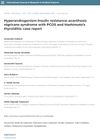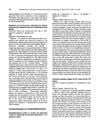 2 citations,
September 2009 in “Nurse Prescribing”
2 citations,
September 2009 in “Nurse Prescribing” PCOS affects many women, causing various symptoms and health risks, and is managed through lifestyle changes, medication, and support groups.
 1 citations,
October 2015 in “Journal of endocrinology and diabetes”
1 citations,
October 2015 in “Journal of endocrinology and diabetes” Understanding Polycystic Ovary Syndrome (PCOS) and its causes can lead to effective treatments.
[object Object] 1 citations,
January 2009 in “PubMed” PCOS affects many women and can cause various health issues, with several treatments available.
 1 citations,
January 2004 in “Elsevier eBooks”
1 citations,
January 2004 in “Elsevier eBooks” Polycystic Ovarian Syndrome (PCOS) is a common condition causing fertility issues and other symptoms, with unclear causes and treatments focused on improving insulin sensitivity.

PCOS is a complex condition that can lead to serious health issues, but early diagnosis and treatment can reduce these risks.

Polycystic ovary syndrome (PCOS) affects about 10% of women, is often linked to obesity and family history, and can cause irregular periods, fertility issues, and other symptoms. It's usually managed with lifestyle changes, weight loss, and medication.

Resveratrol improved hormone levels, menstrual cycles, hair loss, and ovarian function in PCOS patients.
 February 2020 in “Acta Scientific Women's Health”
February 2020 in “Acta Scientific Women's Health” PCOS is a common condition in women that can lead to infertility and other health issues, and it's diagnosed by specific criteria with various treatment options available.
 January 2015 in “International Journal of Research in Medical Sciences”
January 2015 in “International Journal of Research in Medical Sciences” A patient with HAIR-AN syndrome, PCOS, and Hashimoto's thyroiditis improved with early diagnosis and treatment to prevent serious health problems.
 February 2013 in “Journal of The American Academy of Dermatology”
February 2013 in “Journal of The American Academy of Dermatology” Hair loss is a common but often unreported side effect of cancer treatments, especially for breast and prostate cancers.
514 citations,
February 2011 in “International journal of women's health” Different treatments for PCOS focus on the specific symptoms, with weight loss and lifestyle changes being important.
 49 citations,
November 2019 in “Egyptian Journal of Medical Human Genetics”
49 citations,
November 2019 in “Egyptian Journal of Medical Human Genetics” Certain gene variants may contribute to high androgen levels in women with polycystic ovary syndrome.
 34 citations,
May 2017 in “Seminars in Reproductive Medicine”
34 citations,
May 2017 in “Seminars in Reproductive Medicine” Women with PCOS have a higher risk of diabetes, heart problems, certain cancers, and mental health issues, but early treatment can help manage these risks.
 29 citations,
December 2012 in “Current Opinion in Endocrinology, Diabetes and Obesity”
29 citations,
December 2012 in “Current Opinion in Endocrinology, Diabetes and Obesity” With careful management, people with congenital adrenal hyperplasia can have successful pregnancies and become parents.
 16 citations,
December 2007 in “Expert Review of Pharmacoeconomics & Outcomes Research”
16 citations,
December 2007 in “Expert Review of Pharmacoeconomics & Outcomes Research” PCOS lowers quality of life, causing issues like obesity, infertility, and menstrual problems.
 10 citations,
December 2019 in “in Vivo”
10 citations,
December 2019 in “in Vivo” Testosterone makes the connections in the uterus lining simpler and lowers certain protein levels, which might lead to infertility.
 1 citations,
January 2004 in “Drugs”
1 citations,
January 2004 in “Drugs” Ethinylestradiol/Chlormadinone Acetate is a safe and effective birth control pill that also helps regulate menstrual cycles, reduces period pain, and treats certain skin and hair conditions.
 August 2024 in “Indian Journal Of Clinical Practice”
August 2024 in “Indian Journal Of Clinical Practice” A balanced diet and healthy lifestyle help manage PCOS symptoms.
 September 2023 in “Journal of Rawalpindi Medical College/Journal Rawalpindi Medical College”
September 2023 in “Journal of Rawalpindi Medical College/Journal Rawalpindi Medical College” Birth control pills with cyproterone acetate and drosperinone can reduce excessive hair growth in women with PCOS, but they may not be right for everyone.
[object Object]  October 2010 in “Cambridge University Press eBooks”
October 2010 in “Cambridge University Press eBooks” Lifestyle changes like diet and exercise are key for treating overweight women with polycystic ovary syndrome.
 June 1995 in “International Journal of Gynecology & Obstetrics”
June 1995 in “International Journal of Gynecology & Obstetrics” Women with hair loss have higher androgen levels, while men with early balding have altered androgen ratios.
 June 1995 in “International Journal of Gynecology & Obstetrics”
June 1995 in “International Journal of Gynecology & Obstetrics” The new method showed that endometriotic tissue has lower estrogen receptor levels but similar progesterone levels compared to normal endometrium, with both following a similar cycle.
 633 citations,
September 1998 in “The Journal of Clinical Endocrinology and Metabolism”
633 citations,
September 1998 in “The Journal of Clinical Endocrinology and Metabolism” PCOS affects a similar percentage of Black and White women in the Southeastern United States.
 378 citations,
September 1998 in “The Journal of Clinical Endocrinology and Metabolism”
378 citations,
September 1998 in “The Journal of Clinical Endocrinology and Metabolism” PCOS affects about 4% of women in the southeastern U.S. equally across Black and White populations.
 215 citations,
January 2011 in “Reproductive Biology and Endocrinology”
215 citations,
January 2011 in “Reproductive Biology and Endocrinology” About 7% to 15% of Iranian women have polycystic ovary syndrome, depending on the criteria used to diagnose it.
 99 citations,
August 2003 in “Fertility and Sterility”
99 citations,
August 2003 in “Fertility and Sterility” Too much male hormone is the main cause of Polycystic Ovary Syndrome.
 91 citations,
April 2017 in “Diabetes & Metabolic Syndrome: Clinical Research and Reviews”
91 citations,
April 2017 in “Diabetes & Metabolic Syndrome: Clinical Research and Reviews” Eating fewer calories, less sugar and refined carbs, and more low-glycemic and omega-3 rich foods can help manage PCOS symptoms.
 89 citations,
November 2014 in “Medical Clinics of North America”
89 citations,
November 2014 in “Medical Clinics of North America” Eating 500 fewer calories a day and making lifestyle changes can improve PCOS symptoms and reduce diabetes risk; more research is needed on its causes and treatments.
 85 citations,
June 2008 in “Annals of the New York Academy of Sciences”
85 citations,
June 2008 in “Annals of the New York Academy of Sciences” PCOS starts in adolescence with hormonal issues, leading to adult health problems, and early treatment is crucial.
 81 citations,
May 2007 in “Fertility and Sterility”
81 citations,
May 2007 in “Fertility and Sterility” Testosterone therapy seems safe for postmenopausal women for a few years, but more research is needed for long-term effects.




























